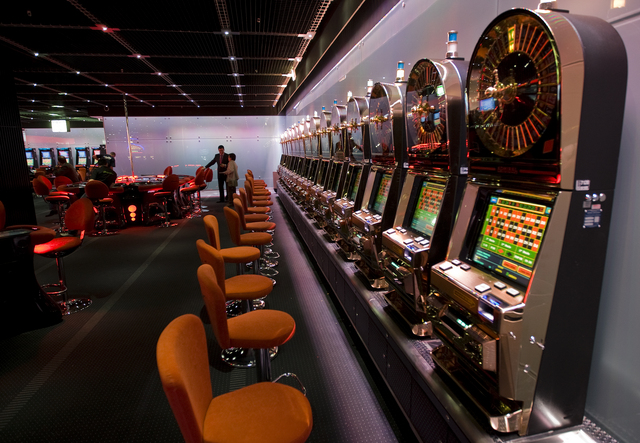
Betting has been an essential part of human entertainment for millions of years, developing through cultures and periods to become the exciting casino games we know today. เว็บตรง From the historical Chinese and Romans, who engaged in multiple forms of betting and chance, to the sophisticated gaming floors of contemporary casinos, the attraction of risk and reward has fascinated individuals across the globe. The transition from basic dice games and primitive betting setups to the extravagant settings of contemporary casinos reflects significant strides in both social norms and technological.
As societies evolved, so too did the complexity of gambling activities, with gambling activities emerging as a unique category of entertainment and thrills. These activities have evolved from casual gatherings centered around traditional tables to grand, opulent establishments designed to entice players. Today, we explore this captivating journey, analyzing how historical practices laid the foundation for the varied and exciting casino games that bring joy to countless people worldwide.
spintax
Ancient Betting Practices
Betting has profound roots in human past, with indications of activities of chance dating back to ancient societies. Archaeologists have uncovered that as far back as 3000 BC, the ancient Chinese were using primitive forms of gambling with dice made from wood. Similarly, ancient cultures of Mesopotamia engaged in betting activities, often relying on the casting of lots or dice to determine outcomes. These early forms of gambling served not only as recreation but also played crucial roles in social and cultural customs.
The Egyptians also were involved in betting activities, with games that included betting on the results of various occurrences, including athletic events and religious festivals. Items such as dice and depictions of players from ancient tombs show that gambling was a frequent pastime. It provided both entertainment and a means of engaging in social connections, often linked to celebratory occasions or important gatherings. This activity showed the universal appeal of chance and rivalry throughout history.
In ancient Rome, betting became a widespread practice among the people, as evidenced by references in texts and the establishment of guidelines around certain activities. Romans enjoyed a variety of gambling activities, from betting on horse races to playing games similar to modern-day board games. The legal structure surrounding these activities began to take shape, establishing the foundations for betting regulations that would grow in the centuries to come. The prevalence of betting during this period set the stage for the development of casino games in the future.
The Progression of Casino Games
Gambling games have gone through notable transformations from their roots to the contemporary entertainment offerings. In ancient civilizations, gaming was commonly linked to ceremonial practices, with dice games found in the ancient Mesopotamian region and wagering on the outcomes of events in ancient Rome. These early forms of gambling laid the groundwork for the organized games we see today. The shift from informal gambling to regulated games happened as societies began establishing rules and venues for wagering, demonstrating cultural values and practices.
The Middle Ages saw the development of card games, which gained popularity among the nobility of Europe nobility. Games like primero and the game baccarat became essential components in social gatherings. The development of printing technology additionally facilitated the spread of playing cards, making them more available to the masses. As gambling houses began to proliferate, these card games transformed into variations that catered to wider audiences, eventually leading to the creation of casinos as exclusive venues for gaming.
The twentieth century marked a pivotal point in the evolution of casino games, with the ascendancy of commercial casinos in Las Vegas and other gaming hubs. This era introduced games like video slots and modern variations of table games, complete with high-quality graphics and detailed betting structures. The advent of online casinos in the late 1990s further transformed the gaming industry, allowing players to access a vast array of casino games from the safety of their homes. Today, casino games continue to evolve, blending classic elements with advanced technology to create immersive experiences for players globally.
Modern Gaming Regulations
In recent years, the landscape of gaming laws has evolved significantly, particularly as technology and internet-based gambling have become more prevalent. Regulatory bodies around the globe have implemented numerous laws and guidelines to make certain that gambling activities are performed equally, with responsibility, and clearly. These regulations often include elements such as licensing, advertising, gambler safeguards, and sensible gambling measures. Authorities aim to mitigate problems such as gambling addiction and fraudulent activities while promoting a equitable gambling environment.
The emergence of online gambling sites has required a new approach to oversight. Many legal areas have created specific internet-based gaming frameworks that serve internet-based gaming, allowing operators to provide their services legally. These structures often demand operators to secure permits, follow strict security standards, and provide customer support options to help players. By vigilantly monitoring online activities, authorities can better protect players from risks and ensure that gambling is conducted in a protected manner.
Additionally, modern gambling laws are increasingly concentrating on responsible gambling strategies. Many gaming establishments and online sites now implement features such as player exclusion, financial limits, and time-outs to help players manage their gambling habits. Educational campaigns aimed at raising awareness about the dangers of gaming are also frequent. As the sector continues to grow, the emphasis on sensible gaming remains a fundamental principle of governing efforts, reflecting a commitment to encouraging a secure and enjoyable gambling experience for all gamblers.
